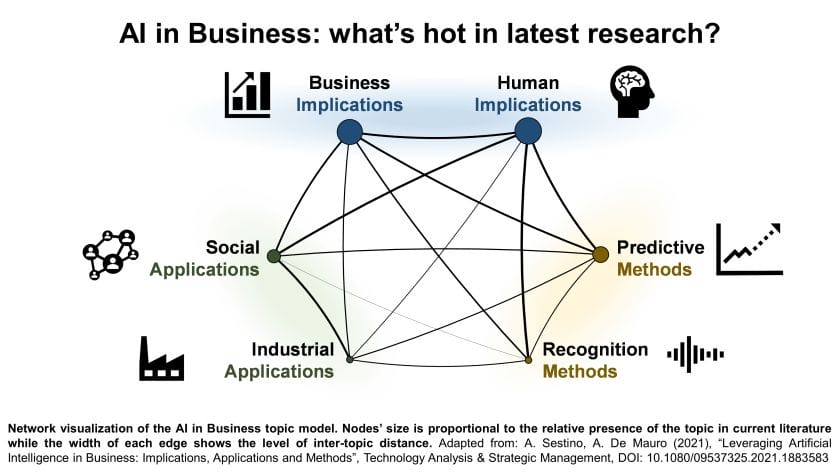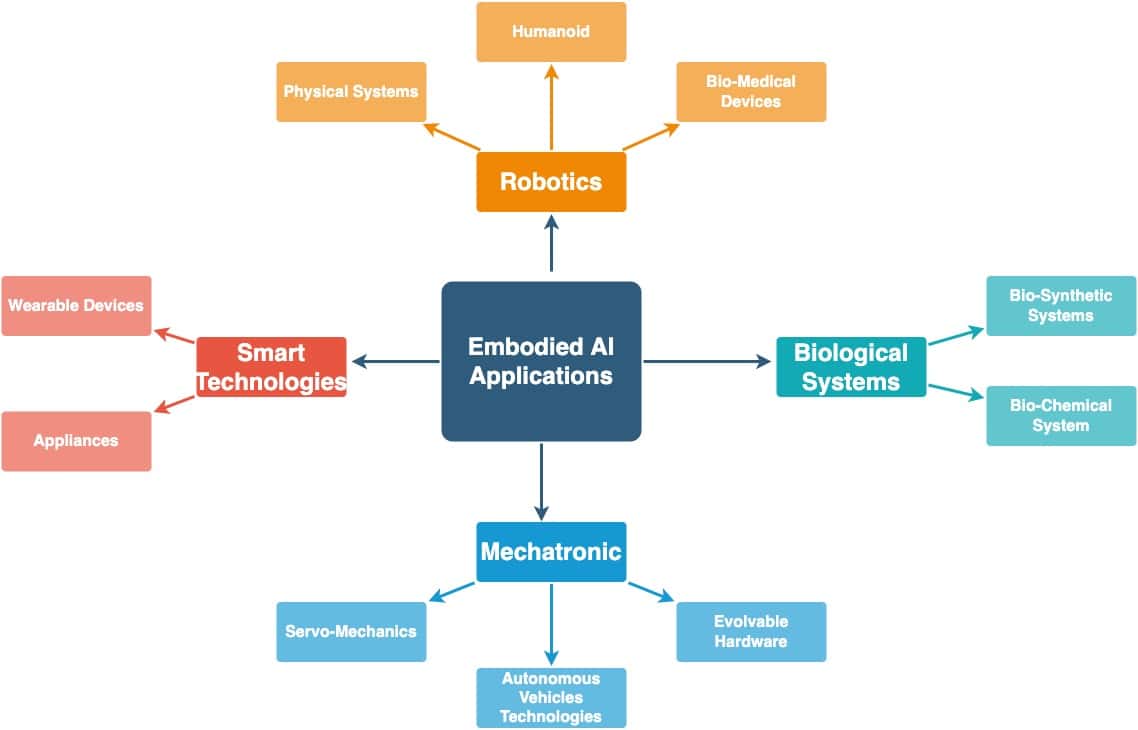Artificial intelligence, or AI, has become an increasingly popular topic in recent years. From healthcare to finance, education to entertainment, AI is being applied in a wide range of industries and sectors. This technology has the potential to revolutionize the way we live and work, offering new opportunities for efficiency, innovation, and growth. In this article, we will explore some of the most exciting applications of artificial intelligence today.
Common Applications of Artificial Intelligence in Today’s World
My Personal Experience with AI Applications
As an AI expert, I have seen firsthand the incredible impact that artificial intelligence has had on our daily lives. From virtual assistants like Siri and Alexa to smart home devices that adjust the temperature and lighting based on your preferences, AI is everywhere around us. One of my favorite examples of AI in action is the recommendation algorithms used by streaming services like Netflix and Spotify. These algorithms analyze your viewing or listening history to suggest new content that you are likely to enjoy.
Examples of Common AI Applications
AI is being integrated into various industries and fields, including healthcare, finance, transportation, customer service, data analysis, agriculture, education, entertainment, marketing, manufacturing and more. Here are some common examples:
– Healthcare: AI-powered medical imaging systems can help doctors detect diseases like cancer at an early stage. Chatbots can assist patients with basic health inquiries and appointment scheduling.
– Finance: Fraud detection systems can use machine learning algorithms to identify suspicious transactions. Chatbots can provide customer support for banking services.
– Transportation: Self-driving cars are equipped with sensors and cameras that use machine learning algorithms to navigate roads safely.
– Customer Service: Chatbots can provide 24/7 support for customer inquiries and complaints.
– Data Analysis: Machine learning algorithms can analyze large datasets to identify patterns and make predictions.
– Agriculture: Drones equipped with sensors and cameras can monitor crop health and soil moisture levels.
– Education: Adaptive learning platforms use machine learning algorithms to personalize educational content for students based on their strengths and weaknesses.
– Entertainment: Recommendation algorithms suggest movies or music based on your viewing or listening history.
– Marketing: Predictive analytics tools use machine learning algorithms to forecast consumer behavior.
The Future of AI Applications
The potential applications of artificial intelligence are limitless, and as technology continues to evolve, we will see even more innovative uses of AI in various industries. It is exciting to imagine what the future holds for AI and how it will continue to shape our daily lives.
How Artificial Intelligence is Integrated into the Healthcare Industry
Artificial intelligence (AI) is rapidly transforming the healthcare industry, from improving patient outcomes to reducing costs. One example of AI in healthcare is the use of machine learning algorithms to analyze medical images such as X-rays and MRI scans. These algorithms can quickly and accurately identify abnormalities that may be missed by human radiologists, leading to earlier diagnosis and treatment.
Another application of AI in healthcare is predictive analytics. By analyzing large amounts of patient data, AI algorithms can identify patterns and predict potential health issues before they become serious. This allows for proactive interventions and personalized treatment plans.
Furthermore, chatbots powered by natural language processing (NLP) are being used to improve patient engagement and support. Patients can ask questions or receive reminders about their medication schedule through a chatbot interface, freeing up time for healthcare professionals to focus on more complex tasks.
The Benefits of AI in Healthcare
The benefits of integrating AI into the healthcare industry are numerous. Some key advantages include:
Improved accuracy:
AI algorithms can analyze vast amounts of data much faster than humans, leading to more accurate diagnoses and treatment plans.
Cost savings:
By automating routine tasks such as appointment scheduling or medical record retrieval, AI can reduce administrative costs for hospitals and clinics.
Better patient outcomes:
Predictive analytics and early detection enabled by AI can lead to earlier intervention and better outcomes for patients.
Artificial Intelligence in Finance and Banking: Examples and Uses
The finance industry has been quick to adopt artificial intelligence technologies due to its ability to handle large amounts of data quickly and accurately. One example is fraud detection – machine learning algorithms can analyze transaction patterns across millions of accounts to identify potential fraudulent activity.
Another application of AI in finance is investment management. By analyzing market trends and historical data, AI algorithms can make more accurate investment decisions than humans. This has led to the rise of robo-advisors, which use AI to provide personalized investment advice to clients.
AI is also being used in customer service in the finance industry. Chatbots powered by natural language processing can handle routine inquiries such as balance checks or transaction histories, freeing up human agents for more complex tasks.
The Advantages of AI in Finance
The advantages of integrating AI into the finance industry include:
Improved accuracy:
AI algorithms can analyze vast amounts of financial data much faster than humans, leading to more accurate investment decisions and fraud detection.
Cost savings:
By automating routine tasks such as customer service inquiries, AI can reduce administrative costs for financial institutions.
Better customer experience:
Chatbots powered by natural language processing can provide 24/7 support to customers, improving their overall experience with financial institutions.
Examples of How Artificial Intelligence is Applied in Transportation and Logistics
Artificial intelligence is transforming the transportation and logistics industry through improved efficiency and safety. One example is route optimization – machine learning algorithms can analyze traffic patterns and weather conditions to suggest the most efficient route for a delivery truck or cargo ship.
Another application of AI in transportation is predictive maintenance. By analyzing sensor data from vehicles or equipment, AI algorithms can predict when maintenance is needed before a breakdown occurs. This reduces downtime and increases safety on the road or at sea.
AI is also being used in autonomous vehicles such as self-driving cars or drones. Machine learning algorithms enable these vehicles to navigate roads or airspace safely and efficiently without human intervention.
The Benefits of AI in Transportation
The benefits of integrating AI into transportation include:
Improved efficiency:
Route optimization enabled by machine learning algorithms reduces travel time and fuel consumption, leading to cost savings for transportation companies.
Increased safety:
Predictive maintenance and autonomous vehicles reduce the risk of accidents on the road or at sea.
Environmental benefits:
By reducing fuel consumption through route optimization and improving traffic flow with autonomous vehicles, AI can have a positive impact on the environment.
The Benefits of Using Artificial Intelligence in Customer Service and Support
Artificial intelligence is transforming customer service and support by providing faster, more personalized assistance to customers. One example is chatbots powered by natural language processing – these can handle routine inquiries such as order status or product information, freeing up human agents for more complex tasks.
Another application of AI in customer service is sentiment analysis. By analyzing social media posts or customer feedback, machine learning algorithms can identify patterns in customer behavior and preferences. This allows companies to tailor their products or services to better meet customer needs.
AI is also being used in voice assistants such as Amazon’s Alexa or Apple’s Siri. These virtual assistants use natural language processing to provide personalized recommendations or perform tasks such as setting reminders or making reservations.
The Advantages of AI in Customer Service
The advantages of integrating AI into customer service include:
Faster response times:
Chatbots powered by natural language processing can provide 24/7 support to customers, reducing wait times for assistance.
Better personalization:
Sentiment analysis enabled by machine learning algorithms allows companies to tailor their products or services to better meet customer needs.
Cost savings:
By automating routine tasks such as order status inquiries, AI can reduce administrative costs for companies while improving the overall customer experience.
How Artificial Intelligence Assists with Data Analysis and Decision-Making Processes
Artificial intelligence is revolutionizing data analysis and decision-making processes by handling large amounts of data quickly and accurately. One example is predictive analytics – machine learning algorithms can analyze historical data to identify patterns and predict future outcomes.
Another application of AI in data analysis is natural language processing. This allows machines to understand human language and analyze unstructured data such as social media posts or customer feedback.
AI is also being used in decision-making processes such as risk management or supply chain optimization. By analyzing vast amounts of data, machine learning algorithms can identify potential risks or areas for improvement in real-time.
The Benefits of AI in Data Analysis and Decision-Making
The benefits of integrating AI into data analysis and decision-making include:
Improved accuracy:
Machine learning algorithms can analyze vast amounts of data much faster than humans, leading to more accurate predictions and decisions.
Cost savings:
By automating routine tasks such as risk management or supply chain optimization, AI can reduce administrative costs for businesses while improving overall efficiency.
Better insights:
Natural language processing enabled by AI allows businesses to analyze unstructured data such as customer feedback or social media posts, providing valuable insights into consumer behavior and preferences.
The Role of Artificial Intelligence in the Development of Autonomous Vehicles
Artificial intelligence is playing a crucial role in the development of autonomous vehicles such as self-driving cars or drones. Machine learning algorithms enable these vehicles to navigate roads or airspace safely and efficiently without human intervention.
Another application of AI in autonomous vehicles is perception systems. These systems use sensors such as cameras or lidar to detect objects on the road or in the sky, allowing the vehicle to make decisions based on its environment.
AI is also being used in mapping systems for autonomous vehicles. By analyzing vast amounts of geographic data, machine learning algorithms can create detailed maps that allow autonomous vehicles to navigate complex environments with ease.
The Advantages of AI in Autonomous Vehicles
The advantages of integrating AI into autonomous vehicles include:
Increased safety:
Perception systems enabled by machine learning algorithms reduce the risk of accidents on the road or in the sky.
Improved efficiency:
Autonomous vehicles can navigate roads or airspace more efficiently than human drivers or pilots, leading to cost savings and reduced travel time.
Better mapping:
AI-enabled mapping systems provide detailed information about roads, buildings, and other features that allow autonomous vehicles to navigate complex environments with ease.
Improving Cybersecurity Measures through the Use of Artificial Intelligence
Artificial intelligence is transforming cybersecurity measures by identifying potential threats and responding to them in real-time. One example is anomaly detection – machine learning algorithms can analyze network traffic patterns to identify unusual behavior that may indicate a cyber attack.
Another application of AI in cybersecurity is threat intelligence. By analyzing vast amounts of data from multiple sources, machine learning algorithms can identify potential threats before they occur and provide recommendations for preventing them.
AI is also being used in incident response. By automating routine tasks such as malware analysis or log analysis, AI can reduce response times and improve overall security for organizations.
The Benefits of AI in Cybersecurity
The benefits of integrating AI into cybersecurity measures include:
Faster response times:
Automated incident response enabled by AI reduces response times to cyber attacks, minimizing damage to organizations.
Better threat detection:
Anomaly detection and threat intelligence enabled by machine learning algorithms allow organizations to identify potential threats before they occur, reducing the risk of a successful cyber attack.
Cost savings:
By automating routine tasks such as malware analysis or log analysis, AI can reduce administrative costs for organizations while improving overall security.
Applying Artificial Intelligence to Agriculture and Farming Practices
Artificial intelligence is transforming agriculture and farming practices by increasing efficiency and reducing waste. One example is precision agriculture – machine learning algorithms can analyze weather patterns, soil quality, and other factors to optimize crop yields.
Another application of AI in agriculture is livestock management. By analyzing data such as feed intake or weight gain, machine learning algorithms can identify potential health issues before they become serious.
AI is also being used in food safety and traceability. By analyzing data from multiple sources such as supply chain records or sensor data from food processing equipment, machine learning algorithms can identify potential contamination risks before they occur.
The Advantages of AI in Agriculture
The advantages of integrating AI into agriculture and farming practices include:
Increased efficiency:
Precision agriculture enabled by machine learning algorithms reduces waste and optimizes crop yields, leading to cost savings for farmers.
Better animal welfare:
Livestock management enabled by AI allows farmers to identify potential health issues early on, improving the overall welfare of animals.
Improved food safety:
Food safety and traceability enabled by machine learning algorithms reduce the risk of contamination or foodborne illness, ensuring that consumers have access to safe and healthy food.
The Impact of Artificial Intelligence on the Education Sector
Artificial intelligence is transforming the education sector by providing personalized learning experiences to students. One example is adaptive learning – machine learning algorithms can analyze student performance data to provide customized recommendations for further study.
Another application of AI in education is chatbots powered by natural language processing. These can handle routine inquiries such as course registration or assignment due dates, freeing up human instructors for more complex tasks.
AI is also being used in grading systems for assignments or exams. By analyzing student work using natural language processing or computer vision technologies, machine learning algorithms can provide more accurate and consistent grading than human instructors.
The Benefits of AI in Education
The benefits of integrating AI into the education sector include:
Personalized learning:
Adaptive learning enabled by machine learning algorithms provides customized recommendations for further study, improving student performance.
Better student engagement:
Chatbots powered by natural language processing can provide 24/7 support to students, improving their overall experience with educational institutions.
Cost savings:
By automating routine tasks such as grading or course registration, AI can reduce administrative costs for educational institutions while improving overall efficiency.
Innovative Uses of Artificial Intelligence in the Entertainment Industry
Artificial intelligence is transforming the entertainment industry by providing new ways to create and consume content. One example is recommendation systems – machine learning algorithms can analyze user data to suggest movies or TV shows that they may enjoy.
Another application of AI in entertainment is content creation. By analyzing vast amounts of data such as social media posts or search queries, machine learning algorithms can identify trends and create content that resonates with audiences.
AI is also being used in virtual assistants for gaming or live events. These assistants use natural language processing to provide personalized recommendations or perform tasks such as setting reminders or purchasing tickets.
The Advantages of AI in Entertainment
The advantages of integrating AI into the entertainment industry include:
Better user experience:
Recommendation systems enabled by machine learning algorithms provide personalized suggestions for movies or TV shows, improving the overall experience for users.
Improved content creation:
Content creation enabled by AI allows producers to identify trends and create content that resonates with audiences, leading to higher engagement and revenue.
Cost savings:
By automating routine tasks such as ticket purchases or event reminders, AI can reduce administrative costs for entertainment companies while improving overall efficiency.
Enhancing Marketing Strategies with the Use of Artificial Intelligence
Artificial intelligence is transforming marketing strategies by providing more accurate targeting and personalized messaging to consumers. One example is predictive analytics – machine learning algorithms can analyze vast amounts of customer data to predict future behavior and preferences.
Another application of AI in marketing is chatbots powered by natural language processing. These can handle routine inquiries such as order status or product information, freeing up human agents for more complex tasks.
AI is also being used in programmatic advertising. By analyzing user data in real-time, machine learning algorithms can serve up ads that are more likely to resonate with individual consumers.
The Benefits of AI in Marketing
The benefits of integrating AI into marketing strategies include:
Better targeting:
Predictive analytics enabled by machine learning algorithms allow marketers to target individual consumers with greater accuracy, leading to higher conversion rates.
Improved customer experience:
Chatbots powered by natural language processing provide 24/7 support to customers, improving their overall experience with brands.
Cost savings:
By automating routine tasks such as order status inquiries or ad placement, AI can reduce administrative costs for marketers while improving overall efficiency.
Employing Artificial Intelligence in Manufacturing and Production Processes: Examples and Advancements
Artificial intelligence is transforming manufacturing and production processes by increasing efficiency and reducing waste. One example is predictive maintenance – machine learning algorithms can
Benefits of Regular Exercise
Physical Benefits
Regular exercise has numerous physical benefits that can improve overall health and wellbeing. One of the most significant benefits is weight management. Exercise helps to burn calories, which can lead to weight loss or maintenance. Additionally, regular exercise can help to build muscle mass, increase bone density, and improve cardiovascular health. This can reduce the risk of chronic diseases such as heart disease, diabetes, and obesity.
List of Physical Benefits:
- Weight management
- Muscle building
- Bone density improvement
- Cardiovascular health improvement
- Risk reduction for chronic diseases such as heart disease, diabetes, and obesity.
Mental Health Benefits
In addition to physical benefits, regular exercise can also have a positive impact on mental health. Exercise releases endorphins in the brain, which are natural mood boosters. This can help to reduce symptoms of depression and anxiety. Additionally, exercise has been shown to improve cognitive function and memory retention.
List of Mental Health Benefits:
- Mood boosting effects through endorphin release in the brain.
- Symptom reduction for depression and anxiety.
- Improvement in cognitive function.
- Better memory retention.
Overall, incorporating regular exercise into your routine can have a multitude of physical and mental health benefits. It is recommended that adults engage in at least 150 minutes of moderate-intensity aerobic activity per week for optimal results.
Benefits of Exercise
Regular exercise has numerous benefits for both physical and mental health. Physical activity can help reduce the risk of chronic diseases such as heart disease, stroke, and diabetes. It can also improve cardiovascular health, strengthen bones and muscles, and increase flexibility and balance. Exercise can also help with weight management by burning calories and increasing metabolism.
In addition to physical benefits, exercise has been shown to have positive effects on mental health as well. Regular exercise can reduce symptoms of anxiety and depression by releasing endorphins that boost mood and reduce stress levels. It can also improve cognitive function by increasing blood flow to the brain and promoting the growth of new neural connections.
Overall, incorporating regular exercise into your routine can have a significant impact on your overall health and well-being.
Types of Exercise
There are many different types of exercise that can provide a variety of benefits. Some popular types include:
Aerobic Exercise:
Aerobic exercise is any activity that gets your heart rate up and increases breathing rate. Examples include running, cycling, swimming, or dancing. Aerobic exercise is great for improving cardiovascular health and burning calories.
Strength Training:
Strength training involves using weights or resistance bands to build muscle strength. This type of exercise is important for maintaining bone density and preventing muscle loss as we age.
Flexibility Training:
Flexibility training involves stretching exercises that improve range of motion in joints and muscles. Yoga or Pilates are great examples of flexibility training that can also promote relaxation.
By incorporating a variety of different types of exercise into your routine, you can achieve a well-rounded fitness program that provides numerous health benefits.
In conclusion, artificial intelligence is being applied in various industries and sectors, from healthcare to finance and beyond. It’s revolutionizing the way we live and work, making processes more efficient and accurate than ever before. If you’re interested in exploring the benefits of AI for your business or organization, get in touch with us today to learn more about our services. Let’s take your operations to the next level!

N/A
N/A
N/A
N/A

N/A
N/A
N/A
N/A
N/A
N/A
N/A
N/A









